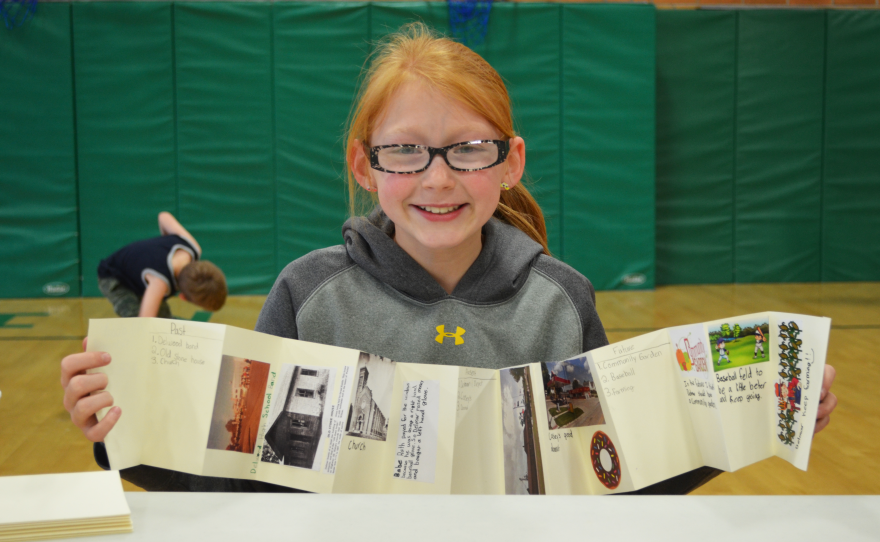As Iowa’s metropolitan areas continue to grow, many small towns across the state are losing people and businesses.
In eastern Iowa, a town of about 500 people is making a more creative attempt at reversing that trend by using an oral history project to stimulate development. Delmar has paired up its youngest and oldest residents to explore how the community’s past and shared values may help shape its future.
In downtown Delmar, the storefronts are empty, paint is peeling off the buildings, and a quiet park has replaced the train tracks that used to dominate the town.
But the scene at the local elementary school--which is now a hub for activity in town--is much livelier.
That’s where an oral history project had students interview long-term residents about Delmar’s past, and contribute to a plan for its future.
In one recorded interview, a student asks, "How has Delmar changed over the years?"
"Oh my, honey, Delmar has really really changed through the years," answers Janet Trekell. "We used to have many more businesses in town. We used to have a hardware store. We used to have a couple of grocery stores, a couple of very active bars."
Older residents also remember a dance hall, high school basketball games, auctions and a doctor's office.
Cathie and Steve Jebsen of the Delmar Development Group are hoping these interviews help them create a vision for the community's future.
"I think it’s supposed to get us to the heart and soul of our community--find out where we came from. I think that’s how you find out where you want to go," Cathie says.
"It’s kind of a good mix of where we want to go--what the kids are looking for, what the older folks are looking for," says Steve Jebsen. "And we hope to get the kids involved—it’s always a good thing. Keep them here."
The project was led by the Iowa Initiative for Sustainable Communities, which was founded by urban planning professor Chuck Connerly. He says making sure some young people stay in small towns is a major part of keeping them sustainable.
"We think it’s very important for the grownups in the community to understand what the kids like," says Connerly. "Because if the community’s going to retain these young people, they should have a say in the future."
"I made this book to show what I want the future to look like and how it can be better by making Delmar have more people come in," says fifth-grader Gus Pickup.
He says he liked learning about the town’s history.
"They had a lot of stuff like stores and bars, and just a lot of stuff that they don’t have today," he says.
Pickup, his classmates and adults all agree Delmar needs a restaurant and maybe a grocery store.
An oral history project is not a typical approach to spurring that kind of growth, but Connerly says jobs go to places where people want to live. And the project highlights a kind of myth that surrounds small-town Iowa.
"To the degree we can fulfill that myth, live up to it--as a friendly place, a place where you don’t have to lock your doors, a place where your kids can walk to school and you don’t have to walk with them--there are a lot of people who value that," Connerly says. "That’s community development, but it really relates to being attractive to people who want to live there, which is economic development."
That was true for the Jebsens' adult children, who moved away from Delmar, but then came back.
“They like the small town. They want to raise their kids here," Cathie Jebsen says. "They can ride their bikes a little more freely."
"They feel comfortable here," Steve adds.
Travis Kraus of the Iowa Initiative for Sustainable Communities says some main themes emerged from the oral history project: Delmar residents of all ages like having strong connections to their neighbors, and they see the elementary school as vital to the town’s survival.
"The decision makers will take that information into the next phase, which will be developing a vision for the community looking forward and to think through some strategic planning and tools they can use in decision making," Kraus says.
Kraus adds he hopes this project can serve as a model for other small Iowa towns that are trying to figure out what their futures might look like.









